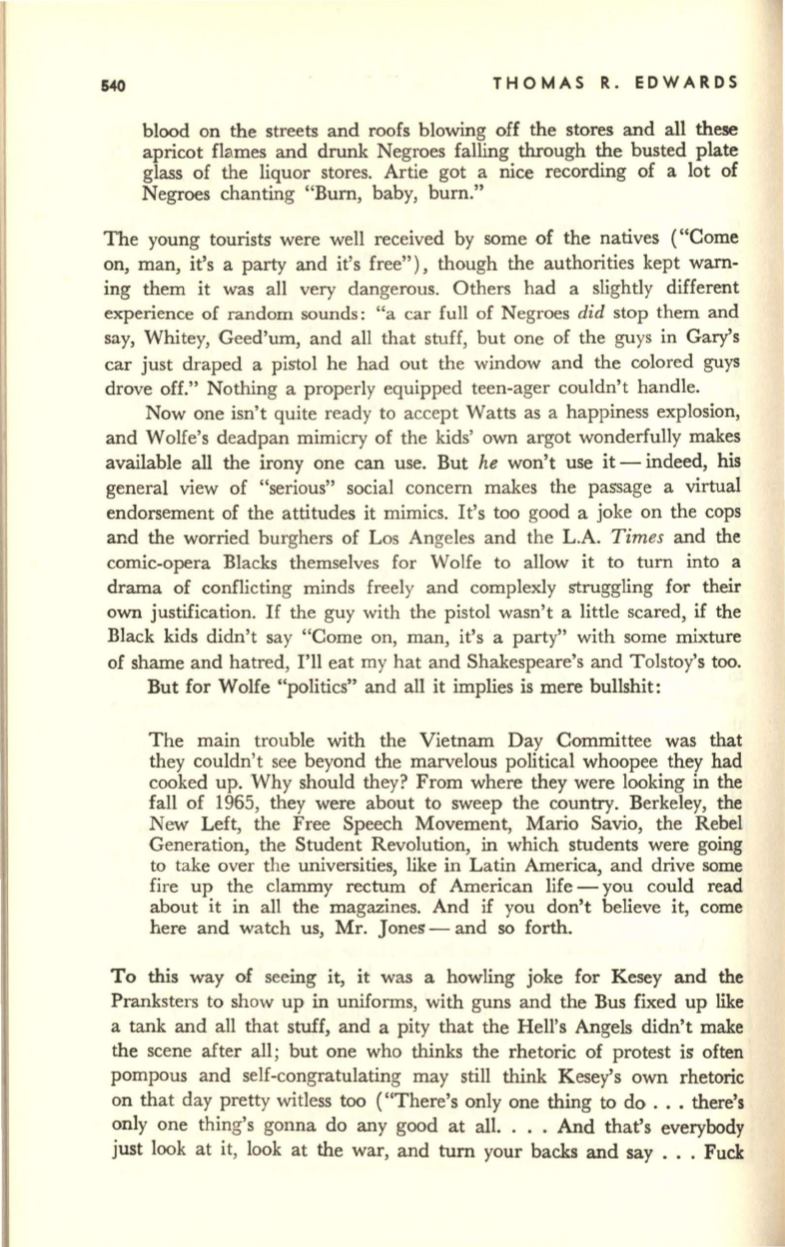
THOMAS R. EDWARDS
blood on the streets and roofs blowing off the stores and all these
apricot flames and drunk Negroes falling through the busted plate
glass of the liquor stores. Artie got a nice recording of a lot of
Negroes chanting "Burn, baby, burn."
The young tourists were well received by some of the natives ("Come
on, man, it's a party and it's free"), though the authorities kept warn–
ing them it was all very dangerous. Others had a slightly different
experience of random sounds: "a car full of Negroes
did
stop them and
say, Whitey, Geed'um, and all that stuff, but one of the guys in Gary's
car just draped a pistol he had out the window and the colored guys
drove off." Nothing a properly equipped teen-ager couldn't handle.
Now one isn't quite ready to accept Watts as a happiness explosion,
and Wolfe's deadpan mimicry of the kids' own argot wonderfully makes
available all the irony one can use. But
he
won't use it - indeed, his
general view of "serious" social concern makes the passage a virtual
endorsement of the attitudes it mimics. It's too good a joke on the cops
and the worried burghers of Los Angeles and the L.A.
Times
and the
comic-opera Blacks themselves for Wolfe to allow it to turn into a
drama of conflicting minds freely and complexly struggling for their
own justification.
If
the guy with the pistol wasn't a little scared, if the
Black kids didn't say "Come on, man, it's a party" with some mixture
of shame and hatred, I'll eat my hat and Shakespeare's and Tolstoy's too.
But for Wolfe "politics" and all it implies is mere bullshit:
The main trouble with the Vietnam Day Committee was that
they couldn't see beyond the marvelous political whoopee they had
cooked up. Why should they? From where they were looking in the
fall of 1965, they were about to sweep the country. Berkeley, the
New Left, the Free Speech Movement, Mario Savio, the Rebel
Generation, the Student Revolution, in which students were going
to take over the universities, like in Latin America, and drive some
fire up the clammy rectum of American life - you could read
about it in all the magazines. And if you don't believe it, come
here and watch us, Mr. Jones - and so forth.
To this way of seeing it, it was a howling joke for Kesey and the
Pranksters to show up in uniforms, with guns and the Bus fixed up like
a
tank
and all that stuff, and a pity that the Hell's Angels didn't make
the scene after all; but one who thinks the rhetoric of protest is often
pompous and self-congratulating may still think Kesey's own rhetoric
on that day pretty witless too ("There's only one thing to do ... there's
only one thing's gonna do any good at all. . . . And that's everybody
just look at it, look at the war, and
turn
your backs and say ... Fuck


